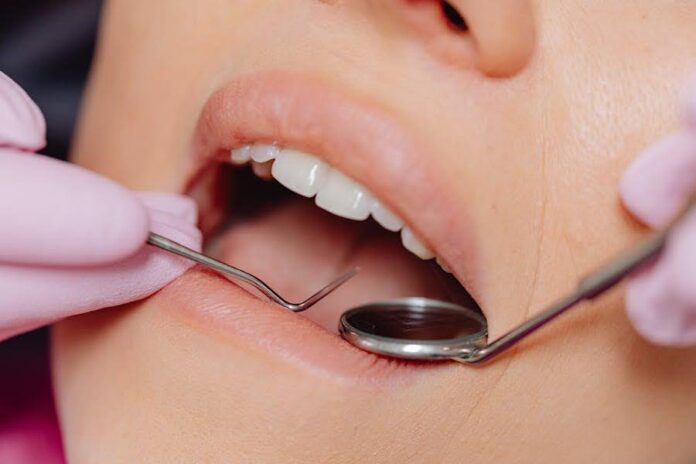Poor oral health can impact your quality of sleep. The relationship between oral health and sleep is crucial, and the connection between them is bidirectional. This is the same as what we eat impacts our oral health. Eating healthy can help you maintain good oral health, and this will eventually lead you towards better sleep.
This blog will let you know everything you need to know about everything you need to know about sleep and oral health, and the connection between them.
The Science Behind the Oral Health–Sleep Connection
Oral health problems can influence sleep quality through physical, inflammatory, and neurological pathways. Misaligned teeth or jaw structure can narrow the airway, making breathing during sleep more difficult and increasing the risk of disorders like obstructive sleep apnea. Inflammation from gum disease can trigger a systemic inflammatory response, which disrupts normal sleep cycles and reduces the amount of deep, restorative rest the body gets.
Pain from issues such as cavities, bruxism, or TMJ disorders activates the body’s stress response, raising cortisol levels. Elevated cortisol delays sleep onset and reduces REM sleep, which is essential for cognitive recovery and overall health. This creates a cycle where poor oral health impairs sleep, and insufficient sleep weakens immunity, allowing dental problems to progress further.
How Oral Health Impacts Sleep
Your oral health isn’t just about avoiding cavities and keeping your breath fresh it also plays a role in how well you sleep. Several dental issues can affect your sleep, either by causing discomfort, waking you during the night, or contributing to more serious sleep disorders.
Sleep Disorders Connected to Oral Health
Some sleep disorders are directly related to conditions in the mouth and jaw. Understanding these connections can help you address the root cause rather than just the symptoms.
Sleep Bruxism
This condition involves grinding or clenching your teeth during sleep, often without realizing it. It’s linked to stress, anxiety, or misaligned teeth. A custom-fit night guard serves as a protective barrier, preventing enamel wear and easing strain on the jaw.
Obstructive Sleep Apnea (OSA)
OSA occurs when the airway becomes blocked during sleep, leading to repeated pauses in breathing. In some cases, the structure of the jaw and tongue position contributes to airway obstruction.
TMJ Disorders
The temporomandibular joint connects your jaw to your skull, and issues with this joint can cause pain, headaches, and jaw clicking. TMJ pain often worsens at night due to teeth clenching. A night guard can provide relief by reducing strain on the joint, and improving bite alignment with invisible teeth aligners can help in the long term.
How Poor Sleep Affects Oral Health
The connection between oral health and sleep is important to understand. Just as dental issues can disturb your sleep, poor-quality rest can negatively impact your teeth and gums. When you’re sleep-deprived, your body produces more stress hormones like cortisol, which can weaken the immune system and make you more susceptible to infections, including gum disease.
Poor sleep also affects saliva production. Saliva helps neutralize acids in the mouth and wash away food particles. Reduced saliva flow during chronic fatigue can create a dry mouth environment, which encourages bacterial growth and increases the risk of cavities and bad breath.
The Role of a Night Guard in Improving Sleep and Oral Health
A night guard is a custom-made oral appliance worn over the teeth during sleep. Its primary role is to protect against the damaging effects of teeth grinding and clenching. It prevents your teeth from enamel wear, reduces jaw muscle strain, and minimizes the risk of cracking or chipping teeth.
For people with sleep bruxism, wearing a night guard can make a difference in comfort and quality of rest. Many users report fewer morning headaches, less jaw soreness, and a deeper, more refreshing sleep. Over time, it also prevents long-term dental damage that can lead to costly treatments.
Lifestyle Habits That Benefit Both Sleep and Oral Health
Improving both your oral health and sleep quality often comes down to building better habits. Consistent oral hygiene, brushing twice a day, flossing daily, and visiting your dentist regularly lay the foundation for healthy teeth and gums. But pairing these practices with good sleep hygiene creates a powerful combination.
Avoiding caffeine and heavy meals close to bedtime, keeping a consistent sleep schedule, and creating a relaxing pre-sleep routine can help you fall asleep faster and stay asleep longer. Managing stress through exercise, meditation, or deep breathing can also reduce teeth grinding at night.
When to Talk to Your Dentist or Doctor
If you regularly wake up with jaw pain, headaches, tooth sensitivity, or feel unrested despite a full night’s sleep, it’s worth speaking to both a dentist and a doctor. Your dentist can identify signs of grinding, misalignment, or TMJ issues and recommend treatments like a night guard.
Wrap up
Your oral health and sleep quality are closely linked, with each directly influencing the other. Conditions like teeth grinding, TMJ disorders, and sleep apnea can disrupt rest, while poor sleep can weaken your immune system and make your mouth more vulnerable to disease. Addressing dental issues in a timely manner through treatments like custom night guards not only protects your teeth and jaw but also supports deeper, more restorative sleep.






